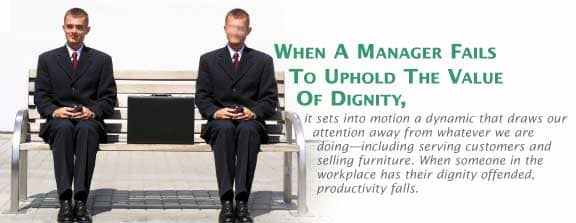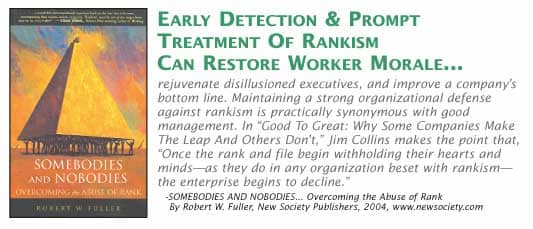How to avoid the abuse of rank that often
leads to the downfall of furniture retail operations.
The downfall of Rhodes Furniture is on the minds of many thoughtful members of our industry these days. Ex-employees are not the only ones asking how it happened that after 130 years of success, a major retailer will be reduced to nothing. This was a furniture empire that recently noted on its website: “A company that has stayed in business that long must be doing something right.”
If you take the time to read the scores of comments on the “Trade Message Board” of FURNITURE WORLD Magazine’s website www.furninfo.com regarding this unfortunate event, it will be obvious that something went terribly wrong. The postings carried much useful information in the absence of corporate communication in the days just before and just after the successful bid by Rooms To Go.
In addition to this sharing of information among mid level managers, corporate insiders, sales, office and delivery employees, I was struck by the tremendous surge of human emotions— dismay, hurt and confusion as well as anger and outrage at the top executives responsible for the corporate culture and direction of the failed firm. Many of us who have worked on the retail side of the furniture industry can empathize with these feelings. I too have been in a spot similar to the Rhodes associates who found themselves suddenly, and without warning, looking for a new job.
Is there a constructive, rational lesson to be learned here? I believe so. Perhaps it is best described by the word, hubris. This is a fancy word used by scholars, but it is appropriate. It means overbearing pride, even arrogance. Hubris is a Greek term that originally described a kind of insolence that leads to personal downfall and ruin.
I don’t know enough about the situation to personally apply the word hubris to Rhodes, but judging from some of the web comments, many of those involved would agree that it fits. The Rhodes tragedy reminded me of some of my own experiences during the thirty-year or so stretch I have served in the furniture industry. I can quickly think of four characters with whom I was associated who went down because they were infected with a blind hubris. These top executives were generally pretty decent guys early in their careers, but once they achieved some success and recognition, something took place that changed them. After this change they could be found strutting down the market halls of High Point. They began to read their press clippings, buy-into their own legends, and decided that they were entitled to much more than a lion’s share of corporate profits.

It’s not that these guys were unaware of the danger to begin with. In fact, I would guess any of them would have been able to expound upon the dangers of too much pride. They had all been victims of other people’s hubris. But, it seems they forgot what it was like. One particular case comes to mind of an executive who told me early in our relationship: “Larry, if I ever start acting arrogant and egotistical like (name deleted) please let me know.” The trouble was, once he began to act like a total ego-maniac, he no longer listened to what anyone had to say about anything. In a last ditch effort, I once quoted him a few lines from Shakespeare:
“... tis a common proof
That lowliness is young ambition’s ladder,
Whereto the climber-upward turns his face;
But when he once attains the upmost round,
He then unto the ladder turns his back,
Looks in the clouds, scorning the base degrees
By which he did ascend.”

Something seemed to stir in him. He asked me to repeat the lines. Then once again, more slowly. He seemed deep in thought for a few moments, and then said: “I don’t get it.” Indeed, he did not.
The Somebodies & The Nobodies
How does hubris begin? With success. Gerald Nachman wrote: “Nothing fails like success.” Because, with success comes the power of being a somebody. This is not to blame power itself; power is what makes the wheels turn. If an individual owns power because he or she is an exceptional performer and maintains a level of distinction, this is the way it should be. But when the wielder of power is simply politically entrenched and begins to abuse power, that’s when the trouble begins. Especially when this abuse is reflected in lack of respect and the tendency to exploit others. Once rankism (abuse of rank) starts, it can reek untold damage on a company or a department. Anyone who has been in the furniture industry has tasted rankism. For some, abuse of rank is so routine it becomes a way of life.

“All Glory is Fleeting”
It has been written that President Richard Nixon watched the movie “Patton” over and over again. The interesting thing is, he never got it. Perhaps it is coincidence, but the four hubris-struck characters I discussed earlier also loved that movie. They didn’t get it either. The most important scene in the movie shows a battlefield, and the unmistakable voice of George C. Scott rumbles on, delivering the theme of the movie:
“For over a thousand years, Roman conquerors returning from the wars enjoyed the honor of a triumph—a tumultuous parade. In the procession came trumpeters and musicians and strange animals from the conquered territories, together with carts laden with treasure and captured armaments. The conqueror rode in a triumphal chariot, the dazed prisoners walking in chains before him. Sometimes his children, robed in white, stood with him in the chariot, or rode the trace horses. A slave stood behind the conqueror, holding a golden crown, and whispering in his ear a warning: all glory is fleeting....”
So it is for all of us... one day you are suddenly a somebody. The next, you may just as quickly be a nobody.
During the early part of my furniture career I was a somebody. I was a marketing executive, setting huge budgets for a nationwide furniture chain. In those days I was especially popular with furniture and media reps. I told great jokes and was loved by everyone, or so it seemed. Then, I decided to go out on my own. In doing so, took a short trip around the desk and stood on the other side. However, in relative status, it could well have been a million miles. Suddenly, no one knew me. I had become, in their eyes, a nobody. I was a vendor with no status. The shock was sobering.
We can have one role in the pecking order in one place and another role in a different place. Large furniture retailers may have hundreds of suppliers providing products and services. They also have customers. Every business has both customers and suppliers. Retailers, after all, supply consumers. And yes, it is consumers who hold the fate of even the most powerful retail CEO’s in their hands.
Most of us have been guilty of practicing rankism at one time or another. But so what? Does it really matter? It does, because creeping rankism can destroy a business over time. Think about it honestly. Is the old spirit of your organization or department beginning to wane? Move quickly if it is. According to Dr. Robert W. Fuller, author of “Somebodies And Nobodies... Overcoming the Abuse of Rank”: “Early detection and prompt treatment of rankism can restore worker morale, rejuvenate disillusioned executives, and improve a company’s bottom line. Maintaining a strong organizational defense against rankism is practically synonymous with good management. In “Good To Great: Why Some Companies Make The Leap And Others Don’t”, Jim Collins makes the point that protecting their firms’ abuses of rank and the indignity such practices sow is the hallmark of great business leaders . . . Once the rank and file begin withholding their hearts and minds—as they do in any organization beset with rankism—the enterprise begins to decline.”
Early Detection and Prompt Treatment
I am going to suggest a means of early detection of rankism in your organization. It usually begins in an unexpected place, a place too often overlooked by even savvy CEOs. First I will set the scene with a little anecdote about the earlier days of Disney.
Very few organizations have achieved the management success of the early days of Disneyland and Disneyworld. Walt Disney died before Disneyworld was completed in Florida. His brother Roy took the reins. It so happened that one morning during the construction of Disneyworld Roy entered the main trailer and spotted a new sign. The sign read: “ALL VENDORS GO TO REAR ENTRANCE.” Roy removed the sign and took it inside with him. He called his crew together and said: “I don’t know who put this sign up. It doesn’t matter. Here at Disney, we don’t operate the way this sign reads. We treat everyone with respect. Not just associates and customers and the community. Everyone. Including, and maybe even especially, our vendors.”
Roy Disney knew that the first place where most organizations begin to allow slippage and lack of respect is how they treat their vendors. Possibly no group was hurt worse than the vendors who served Rhodes. I didn’t see any reps writing to express outrage. Generally vendors must suffer in silence, they have to stuff their feelings. However, I want to point out that disrespectful treatment to anyone is the direct result of a company’s culture. And a company’s culture is the responsibility of the individual at the top. Since most vendors have no recourse, they are especially vulnerable to rankism. Roy Disney was an exceptionally enlightened CEO. When he spotted deterioration in the Disney culture he moved quickly to correct it.
The reason a CEO must be especially vigilant is because though most of us experience rankism, we don’t usually protest it. Robert W. Fuller points out in his book that this is like Uncle Tom’s policy of “to get along, go along.” He points out that most people will go along because the power difference upon which rankism is predicated makes resisting it or confronting it dangerous . . . Uncle Tom’s strategy of appeasement eventually ended in disaster. So, I definitely advise associates to speak up. Unless they work in a truly inhuman company, and then they should bail as soon as it is possible.
Fuller suggests that in the face of injustice, most of us sense that there is something about human beings “that is worthy of respect, and that we are all equal in one important sense.” Of course, he is not claiming that we are all equal in our talents and gifts—or any physically measurable trait. What then? We can generally agree with what Fuller writes:
“For millennia, there have been people of every faith, often in opposition to their religious leaders, who sensed that all human beings are of equal dignity. Rankism is invariably an assault on dignity. If people are fundamentally equal in dignity, then discrimination on the basis of power differences—experienced as an insult to dignity—has no legitimacy and must be disallowed.”
How To Sell More Furniture
But, what does all of this have to do with selling more furniture? Just this: we must be aware that when a manager fails to uphold the value of dignity, it sets into motion a dynamic that draws our attention away from whatever we are doing—including serving customers and selling furniture. When someone in the workplace has their dignity offended, productivity falls.
When the high and mighty fall it gives us all pause. They take many innocent associates and vendors with them. And, too often, the leaders responsible manage to escape unscathed, maybe even enriched. This is unjust, and, other than an understanding born of experience, I have no good answer for it. There are just too many factors beyond the control of the associates, and even sometimes beyond the control of the CEO of a company.
However, there is one key factor that the CEO can and must control. It takes eternal vigilance. Failure or deterioration in this factor must be attended to quickly, with passion, and with surgical objectivity. That factor is the culture of the organization. When left to their own devices, less enlightened managers can foster an abuse of rank that will soon spread like a virus to other associates. Never sanction rankism in any form. A small leak can eventually sink even a great ship.
Contributing Editor Larry Mullins has 30+ years experience in the front lines of furniture marketing. Over the past ten years he has developed a remarkable new Visionary Management program that can impact the culture of an entire organization and bring it to life. He also produces state-of- the-art promotional advertising packages for everything from quick cash flow to complete exit strategies and store closings. Larry is President and CEO of UltraSales, Inc.. Inquiries on any aspect of promotional events or advertising can be sent to Larry care of FURNITURE WORLD at mullins@furninfo.com